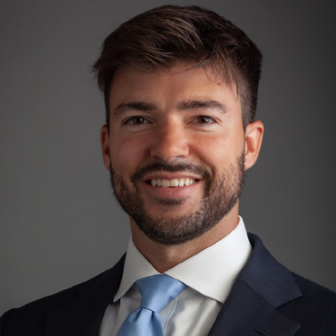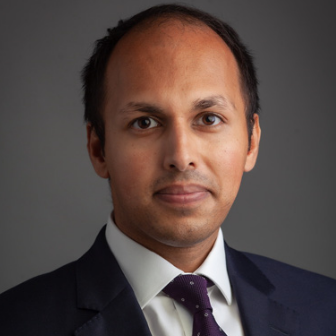Tim Crockford
Head of Equity Impact Solutions
Host:
Thanks for joining us today, where I am joined by Tim Crockford, manager of the Regnan Global Equity Impact Solution Strategy. Tim works for Regnan, the impact investing arm of JO Hambro Capital Management. Today, Tim will provide us with an update on the last year, recent market movements, and how he is positioning the strategy. We heard so much about impact investing in 2021, can we expect the same over the next 12 months? What does it mean for portfolio construction? Tim, let's start from the very beginning. Define impact investing in a Regnan context.
Tim Crockford:
So, impact investing in a general context is really all about making investments with the intention of generating a specific and measurable positive impact. So, it's about directing capital towards companies that can really contribute solutions to some of the major environmental and social challenges that the world is facing. In a Regnan context, of course being part of the Group, that means we are very much focused on marketable securities on credit and equity, and here in London, we manage a global impact investment product.
Host:
Okay. We heard so much about ESG and impact investing last year, particularly in the lead up to Glasgow. Was that peak impact investing, or is it going to continue to be as much focused this year and beyond, as there has been?
Tim Crockford:
I'm pretty comfortable in forecasting that it's not a peak impact investing. I think, we look at some of the stats in terms of flows into impact classes, and as you rightly say, over the last 12 months, perhaps even a little bit more than that, we've seen a massive pickup, in terms of assets flowing into impact investing vehicles. Of course, depending on how you define impact investing. But what we see generally across the board, regardless of how you define it, we are very much at the early stages of assets really coming into dedicated impact strategies. So, I think that's very exciting from where we sit, because whereas for a long time the investors we would speak to were located in a very concentrated area, perhaps within Europe, I think now more broadly we are seeing demand for impact investing strategies broaden out worldwide.
Tim Crockford:
So, I think that's exciting from where we are with respect to the industry, and I think we are at the very early stages of this. With respect to interest and media coverage, absolutely. I think, look, going into COP last year, there was a lot of focus on it and the global pandemic only helped to really shine the spotlight on impact investing. So, I think, hopefully now things get a little bit quieter in terms of the hype, and we focus more on seeing people actually convert into these strategies.
Host:
Okay. So, with that in mind, the fact that it's actually early stages for impact investing, how does that translate more generally to the outlook for the next year, two, three years? I'm really trying to get to the number. How should investors be thinking about it?
Tim Crockford:
Look, I think the impact investing strategies, regardless of the asset class, regardless of how you're investing, they're always going to be long duration strategies. They're always going to be investments that you make with view to the very long term. So, I think that has to be a consideration for anyone who is thinking about making a step into an impact investment vehicle. I think from a public equity point of view, what that means is that impact investors will run with portfolios, which are vastly different to the global equity benchmarks that you might try and measure their performance against, particularly with respect to the hype and the size of company that you're investing in. Impact investing vehicles, by their very nature, will tend to divert capital towards smaller and medium size companies, as opposed to some of the world's mega caps and some of the Blue Chip stocks that will typically dominate equity indices.
Tim Crockford:
So, I think investors need to have that in mind, because what it means is that in more traditional terms, these are strategies that will run with very high active shares, very high tracking errors. That causes of course, relative volatility compared to the benchmark on both sides of the coin. But I think what we are finding more and more is that investors across all shapes and sizes of investors, they like that. They like the long term view that impact investors take. They like the fact that they can understand the themes that will ultimately drive the creation, the growth of their capital, over the long term holding periods that impact investors typically take. So, I think more and more we see investors resonating with this longer term view and seeing through the shorter term noise and volatility that markets typically throw up.
Host:
So, it means then, that as an investor, I'm going to have to think a little bit more laterally than previously, where I might have just compared to benchmarks and things like that. But what you're saying is, if you want to be in impact investing, and I presume you're saying that over the longer term it's likely to outperform because it is at the beginning of its life cycle. If that's the case, investors are going to have to rethink a little bit about how they compare what they're trying to get out of it, and how they judge their investments.
Tim Crockford:
I think the way in which they judge their investments in the longer run, the old rules will still apply. But I think, you've alluded to it there, it's more the timeframe on which they judge them which is important. I think, like you said over there, you're talking about companies that are transforming not just the actual communities and environment in which they have an impact, but they, themselves as businesses are being transformed by the rapid growth in demand that they are seeing for the products and the services that they sell. Of course, that's not something that plays out in a matter of weeks, months, or quarters. That's something that plays out over multiple years as they move up the adoption curve. So, yeah. I think investors that are new to impact investing need to keep that in mind, because particularly in periods like this, where markets are highly volatile and it's sentiment that's driving equity prices, as opposed to actual fundamentals and revenue and earnings growth, typically that is going to mean that you get some big swings around in shorter term performance.
Host:
All right. So, if I'm putting together a portfolio and I want it to be an impact investing portfolio, what are the things I should be looking out for? What are the things perhaps I should be wary of?
Tim Crockford:
Well, I think with impact investing being in its early days, I think obviously it's easy enough to call a strategy an impact strategy. I think that the challenge is really proving that you are doing what you say on the tin. So, in terms of what you should be looking at as an investor looking for an impact strategy, I think the first thing you have to dig under is understanding what the investments are, and perhaps more importantly, the process to validate the impact that those investments potentially will have, because it's all well and good sticking of a few pictures of solar panels or wind turbines in a presentation. Really what you need to look for is the repeatability with which that process can validate that an investment is in fact, going to have a net positive impact over the course of its holding period.
Tim Crockford:
So, I really think it comes down to process to validate and show, articulate to the investors what that impact is. It comes down to expertise as well. If you look at the team that I'm lucky enough to work with, the core investment team has been doing this for many years now, but of course, we have access to some professionals in Regnan over there in Australia who've been doing this for decades, which of course really brings a wealth of experience in. Being able to understand the sort of environmental and social issues that we're trying to address, that's what it really comes down to. This is really about problem solving. So, to really understand how to solve the problem, you need to know what it is that you're trying to solve in the first place. So, I say the second thing is really looking deep into the skillset and the expertise that exists to be able to do that.
Host:
Thank you so much for that, Tim. It's insightful as always, and thanks to you listeners for giving up the time today. If you want to know more about Tim at Regnan or the Global Equity Impact Solution Strategy, then please visit regnan.com.
This podcast is for professional investors only. The information contained within this podcast including any expression of opinion is for information purposes only and is given on the understanding that it is not a recommendation. Views as of date of recording, 01 March 2022, and are subject to change. Past performance is no guarantee of future performance. The value of investments and the income from them may go down as well as up and you may not get back your original investment.
By clicking Proceed I confirm I have read the important information and agree to the terms of use.
This website uses cookies to remember your preferences and help us improve the site. By proceeding, you agree to cookies being placed on your computer. Read our privacy and cookie notices.
For a better experience, we recommend viewing this website in landscape orientation.

Head of Equity Impact Solutions
14 years' industry experience, joined Regnan in June 2020.
Tim Crockford leads the Regnan Equity Impact Solutions team. He previously managed the Hermes Impact Opportunities Equity Fund from its launch in December 2017, having co-founded the Hermes Impact team in 2016. Tim joined Hermes Investment Management in 2009 as a research analyst for the European Equities team and became lead portfolio manager of the ESG-integrated Hermes Europe ex-UK Equity Fund in 2015, which he also managed until he left Hermes.

CFA, Fund Manager
13 years’ industry experience, joined Regnan in May 2020.
Mohsin is a fund manager dedicated to the strategy. He was previously a senior analyst on the Hermes Impact Opportunities Equity Fund, having joined Hermes in 2017. Prior to Hermes, Mohsin was an investment manager in Global Equities at Pictet Asset Management. At Pictet his experience included working on thematic equity funds including Water, Clean Energy and Agriculture.

CFA, Analyst
10 years’ industry experience, joined Regnan in May 2020.
Maxime is an investment analyst dedicated to the strategy. He has a decade of experience in sustainable investment. Previously, as an investment analyst at Hermes from 2016, he participated in the design, launch and management of the Hermes Impact Opportunities Equity Fund. Prior to this he led the integration of ESG and stewardship across investment strategies.

CFA, Analyst
6 years’ industry experience, joined Regnan in April 2020.
Maxine is an investment analyst dedicated to the strategy. She was previously an analyst on the Hermes Impact Opportunities Equity Fund. Maxime transferred to the Hermes Impact team in 2016, having initially joined the Hermes EOS team in 2014. She headed up the chemicals sector team, while also focusing on the financial services, industrials and technology sectors.
